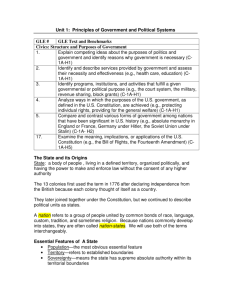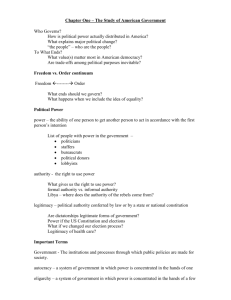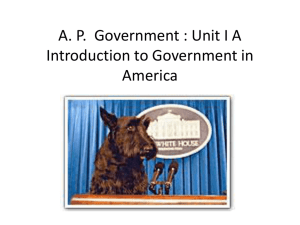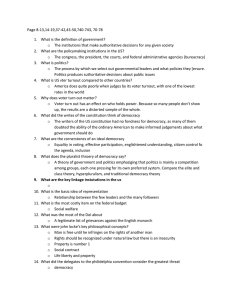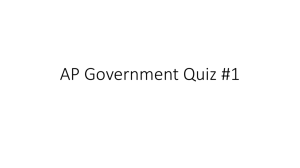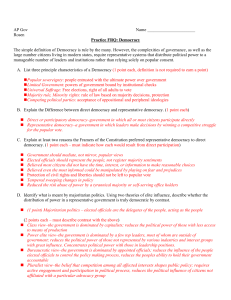Politics, Power, and Government
advertisement
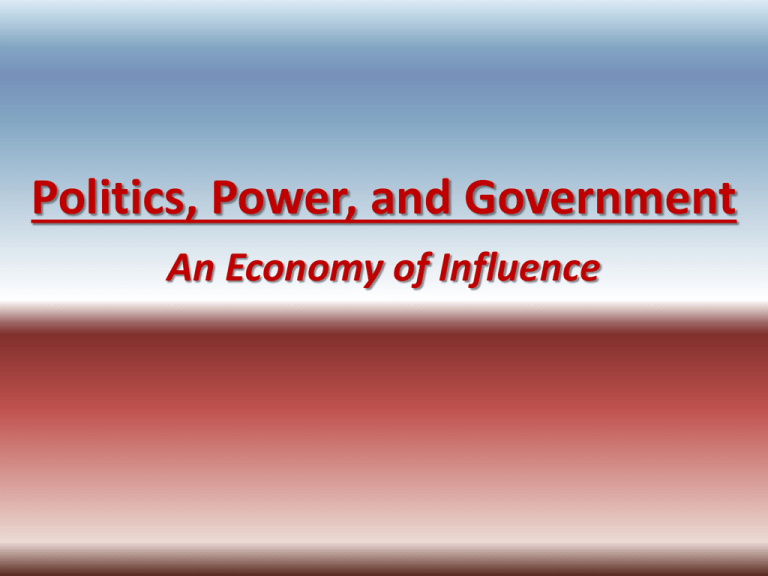
Politics, Power, and Government An Economy of Influence What is Politics? • Politics: the process of who gets what, when, and how (Harold Lasswell) – the economics of interaction and conflict resolution … distribution of resources (tangible and human) through the currency of influence – desire to obtain wealth, prestige, and security Power • What is power? What makes one powerful? In what ways can one be powerful? – The ability to get someone to do something that they otherwise would not do – May be derived by position, prestige, coercion – Authority: power recognized to be accepted as binding (legally, morally, institutionally) What is Government • A political institution that: 1.) Makes rules determining who gets society’s valuable resources 2.) Regulate the use of legal force • Basic Functions 1. 2. 3. 4. Maintain Order Protect/Defend citizens Provide services Control economy • Two Questions: 1. 2. Who governs? To what Ends? Why is government political? • Need to find acceptable solutions to political conflict: disputes over society’s valued resources between both individuals as well as interest groups • Must set rules, create institutions, and execute policies (through force if necessary) • Inevitably certain groups benefit from government actions while others suffer because of them Democracy • Political power is vested in the people “The best argument against democracy is a five-minute conversation with the average voter” Democracy in Action » Direct democracy: direct participation by the citizens in all government actions » Democratic republic: based on popular sovereignty, citizens elect representatives to create and execute government policy » Representative Democracy: similar to republican government, but may share sovereignty with a monarch or despot Principles of Democracy » Popular sovereignty: people entrusted with the ultimate power over government » Limited Government: powers of government bound by institutional checks » Universal Suffrage: Free elections, right of all adults to vote » Majority rule, Minority rights: rule of law based on majority decisions, protection » Competing political parties: acceptance of oppositional and peripheral ideologies Constitution vs. Constitutional Gov’t Constitution: • Identifies basic principles of government • Establishes basic structure, powers, and duties of government • Supreme law Constitutional government: • constitution has the authority to place limits on government – “Limited Government” – Rule of law How Is Political Power Distributed? • Majoritarian politics – elected officials are the delegates of the people, acting as the people • Political elite – 4 descriptions – elites reflect a dominant social class – a group of business, military, labor union, and elected officials control all decisions – appointed bureaucrats run everything – representatives of a large number of interest groups are in charge How Is Political Power Distributed? • Class view–the government is dominated by capitalists • Power elite view–the government is dominated by a few top leaders, most of whom are outside of government • Bureaucratic view–the government is dominated by appointed officials • Pluralist view–the belief that competition among all affected interests shapes public policy What Explains Political Change? • Government and its policies are shaped by – – – – Economic interests Powerful elites Entrenched bureaucrats Competing pressure groups – Morally impassioned individuals • The dominant political problem of the time shapes the nature of day-to-day political conflict through – Deep-seated beliefs – Major economic developments – Widely shared (or competing) opinions The Nature of Politics • Judgments about institutions and interests can be made only after one has seen how they behave on a variety of important issues or potential issues, such as – – – – – economic policy the regulation of business social welfare civil rights and liberties foreign and military affairs


